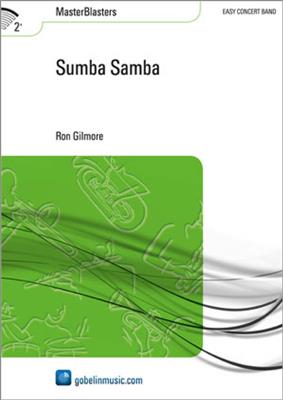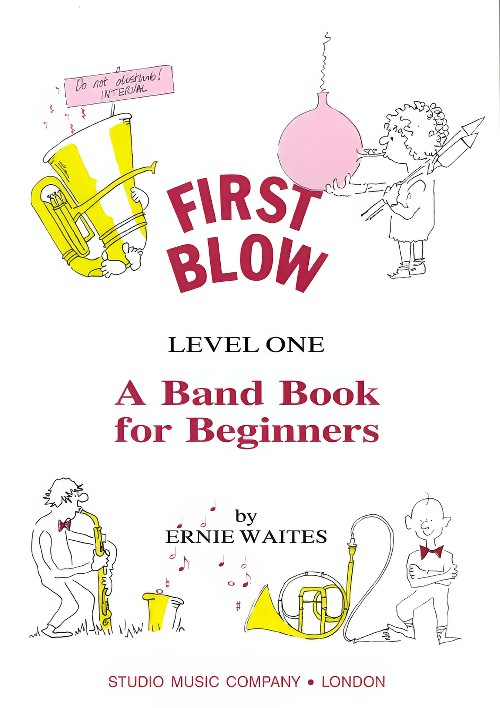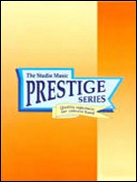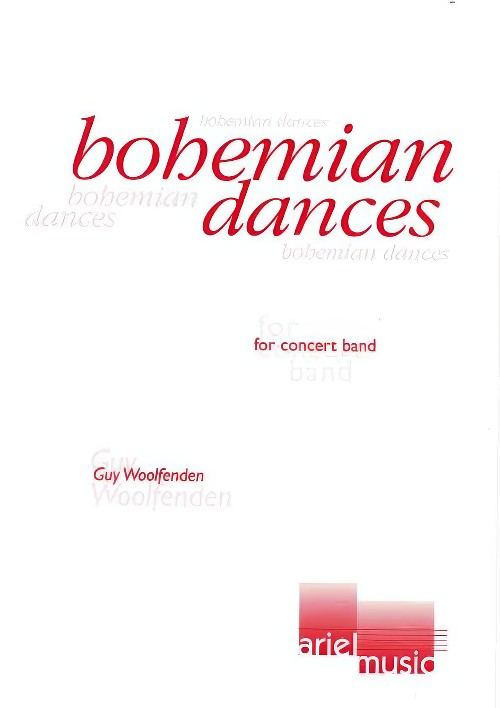Results
-
 £109.99
£109.99Metalla - Jan Van der Roost
Metalla was commissioned by the 'Kreisverband Altenkirchen' of Germany and dedicated to Ottomar Jung. The composer himself conducted the premiere of the piece, which was performed by the 'Jugendorchester Kreisverband Altenkirchen' on 25 March 1999.The region of Altenkirchen is known for its iron mines, which find musical expression in the dark mood of the introduction (andante misterioso). This effect is accomplished with overlapping seventh intervals, orchestral crescendos, a succession of broad chords and the presentation of most themes in the middle register of the band.The dynamic section (allegro energico) that follows the introduction is characterized by concise figures inthe brass and a second motif, a kind of rippling motion depicting the Sieg River, an important element in the landscape of the Altenkirchen region.The work closes with a final theme that returns a number of times, albeit in different guises. After a brief repeat of the seventh intervals from the beginning, a last radiant chord signals the end of the piece.
Estimated dispatch 7-14 working days
-
 £60.99
£60.99They are Coming - John Emerson Blackstone
There are people who are capable of planning well. They live their lives in a well-structured manner and know exactly what they have to do. On the other hand, there are also people who are the exact opposite: they want to do too many things at once and are often somewhat absent-minded, which occasionally results in frantic situations. The outcome of one such situation is 'They are coming'. John Emerson Blackstone had been working on a new composition for some time when he received a telephone call from his editor, who told him that the deadline was approaching rapidly, even worse, that it would expire at the end of that same day and that he would drop by in person to fetch thecomposition! Blackstone set to work in a frenzy and completed the last details. When his editor arrived, the piece was finished ..... and got its definitive title: 'They are coming'.
Estimated dispatch 7-14 working days
-
 £109.99
£109.99Frida's Whiskers - David Well
David Well composed 'Frida's Whiskers' in commemoration of his own cat, who met an untimely end. Frida (whose real name was 'Godefrida van Coopersburg thoe Nieuwenhuys') was a lively creature, who led a playful and uncomplicated life. She used to sleep in her basket for hours, but when she woke up she upset the entire house and its furnishing. Curtains were inspected from top to bottom and flower pots fell from window-sills just like that! Outside, in the open air she was in her element. She used to frolic, bouncing into the air. After such playful moods she would return to her basket tired but satisfied where, being the cleanly cat that shewas, she subjected her entire body, whiskers included, to a thorough wash.
Estimated dispatch 7-14 working days
-
 £60.99
£60.99Sumba Samba - Ron Gilmore
The Samba is a Latin American dance, which is mostly associated with parties, as a result of the fast tempo in which it is usually played. 'Sumba Samba' forms an exception to this rule. In order to get this samba to swing it is important to stick to the tempo prescribed. 'Sumba Samba' starts with a motif which will play an important role throughout the piece. This motif can be heard in the first notes of the 'refrain' and, as said before, has been used in the introduction, as well as in the transition after the middle part (letter G). Furthermore, it plays an important role in the middle part itself (letter E), in which the samba has momentarily disappeared and acompletely different atmosphere has been created. At letter H we pick up where we left off with the samba and swing to the end of this composition.
Estimated dispatch 7-14 working days
-
 £104.99
£104.99Variations on Shalom Chaverim - Andreas Ludwig Schulte
Shalom Chaverim is an ancient Hebrew (farewell)song, which was originally sung at the end of a celebration or meeting. It was and is mostly sung as a round. Freely translated the words mean "Goodbye, friends, goodbye and see you again!". The varying moods at a parting have been captured very well by Andreas Schulte in his arrangement 'Variations on Shalom Chaverim'. The composer himself says about the song, 'Although the melody is in a minor key, the overall atmosphere in the song is positive. one wishes each other all the best. Saying goodbye, however, also hurts. When you slow down the pace of the melody and add 'blue notes' in the harmonies, this can be sensed immediately.'Schulte refers here to the first variation. The second variation is very intense with possibly even deeper-felt emotions. 'Variations on Shalom Chaverim' ends on a cheerful and positive note, in fast tempo, and with oriental elements in the melody: 'L'hitra'ot, Shalom' (See you again, and farewell!).
Estimated dispatch 7-14 working days
-
 £126.50
£126.50Slava! - Wind Band - Leonard Bernstein
The first theme of Slava! is a vaudevillian razz-ma-tazz tune filled with side-slipping modulations and sliding trombones. The second theme is a canon, and after a brief development section, the two themes recur in reverse order. Near the end, they are combined with a quotation (proclaimed by the ubiquitous trombones) from the Coronation Scene of Moussorgsky's 'Boris Goudonov', where the chorus sings the Russian word slava!, meaning, glory! In this way, the composer is paying homage to his friend Mistislav Rostropovich, called 'Slava' by his friends and to whom the overture is fondly dedicated. The overture was written to celebrateRostropovich's inauguration as music director of the National Symphony Orchestra in Washington, D.C., in 1977. Leonard Bernstein, the son of a Russian immigrant, was born near Boston, Mass., and studied composition at Harvard. Called 'an authentic American hero, an arts hero,' Bernstein had a distinguished career as composer and conductor. - James Huff
Estimated dispatch 7-14 working days
-
£60.99
Der Zaubermarsch - Rob Ares
On 30th September 1791, a few months before his death, the opera "Die Zauberflote" (The Magic Flute) by Wolfgang Amadeus Mozart was given its first performance. It was remarkable that despite his ill health and his disastrous financial situation he was able to compose a work of such comic genius. Mozart composed the overture in the two days before the premier of the opera and it is on this overture that this transcription is based. To perform the work 'a la Mozart' only the timpani part should be used, the additional percussion parts have been added by the arranger and are therefore optional.Mozart 40th SymphonyThe Austrian composer Wolfgang Amadeus Mozart lived atragically short life of thirty-five years. Towards the end of his life in the summer of 1788, he wrote three symphonies in the span of a little over six weeks. His Symphony No.40 in G Minor was one of those great works. This setting of the first movement from that Symphony provides ample demonstration of the composer's grace, inventiveness and pervasive sense of humour, which can be found throughout his music.
Estimated dispatch 7-14 working days
-
 £19.95
£19.95First Blow - Level 1 (Piano Conductor Score) - Waites, Ernie
The aim of the book is to encourage group-playing in the early stages of learning. To this end, all the parts are deliberately simple and stick strictly to the four parts in the score. In addition there is percussion part (for which instruments should be chosen for each piece) and two learner parts (flute and trombone) for players who have learned only a handful of notes.Dynamics are not given - teachers should allow the players to try the pieces at different levels.The book is suitable for wind of brass bands (of a mixture of both!) and so far as possible, an equal number of players should be allocated to each part. If there is a lack of one of the parts, this part can be reinforced on piano, playing from the score.If clarinet players of a higher standard are available, they may prefer to play the 'upper octave' parts as this will brighten the overall sound of the band.Voices:Part 1 in C, Bb, Bb Upper Octave, EbPart 2 in Bb, Bb Upper Octave, Eb, FPart 3 in Bb, Bb Upper Octave, Eb, F, C BC, Bb BCPart 4 in Bb, Eb, C BC, Bb BC, Eb BCPercussionLerner FluteLerner TrombonePieces include:MarchPolkaShipsHymnCzardasStudy No.1NightfallStudy No.2CharlestonWaltzSlapstick
Estimated dispatch 7-14 working days
-
 £49.95
£49.95BLACK FIRE (after Paradise Lost) (Violin Solo with Concert Band - Score only) - Clarke, Nigel
This is not a straight forward concerto, but rather a symphonic drama for violin and ensemble. It uses the soloist as both protagonist and ensemble player, much as Berlioz treated the viola in his symphony 'Harold in Italy'. Black Fire is written in one movement though it has three clear sections (slow, fast and slow). The music reflects the various shades of darkness and suffering that dominate the atmosphere of the early part of the poem. The violinist takes the role of Satan, reflecting his moods, from righteous indignation to sorrowful remorse. A motif from Wagner's opera 'Gotterdaemmerung' (Twighlight of the Gods) is used throughout the work to represent Satan's brooding hatred. At the end of the work you will find Satan in the form of the solo violin heroically travelling towards Paradise to corrupt 'Mankind'. Duration: 26:00
Estimated dispatch 7-14 working days
-
 £115.00
£115.00BOHEMIAN DANCES (Concert Band) - Woolfenden, Guy
Includes:1. Shepherds and Shepherdesses2. Florizel and Perdita3. Dance of the SatyrsOne of my favourite Shakespeare plays is The Winter's Tale, and I have written music for three completely different productions during my time as Head of Music to the Royal Shakespeare Company. One, starring Judi Dench as both the mother, Hermione and her daughter, Perdita, had a big band Tribal Love-Rock score; another had a more classical, but timeless feel to it, and the last was an excellent small-scale touring production, for which I was allowed only a handful of instruments. It is from this source that the basic themes for Bohemian Dances, and an earlier version Three Dances for Clarinet Choir, have emerged. Act IV of the play is set in the kingdom of Bohemia - hence the title of the work.Shakespeare calls for "A Dance of Shepherds and Shepherdesses", which gives Florizel, the son of Polixenes, (King of Bohemia) a chance to become better acquainted with the beautiful Perdita, the lost daughter of Leontes, (King of Sicilia). This movement is written in seemingly tricky and ever-changing metres, but is rhythmically quite logical and melodically catchy.The slower second movement 'Florizel and Perdita' is the lovers' pas de deux: a gentle, slow waltz-like tune, initially presented by the principal oboe, is contrasted with a lndler-like double time melody, at the end of which a solo clarinet makes a link to the last movement.'Dance of the Satyrs' is a rip-roaring, foot-stamping dance performed in the play by 'three carters, three shepherds, three neat-herds, and three swine-herds', who enter in outrageous costumes representing the lecherous half-man, half-goat of Greek mythology. This dance is referred to as a "gallimaufry of gambols" - now where have I heard that word before?! - GW
Estimated dispatch 7-14 working days
